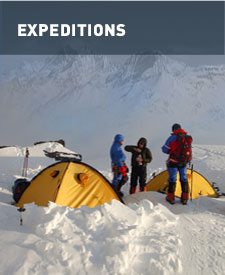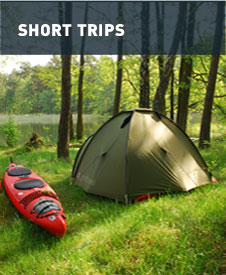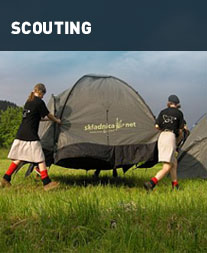We departed Warsaw on July 12, 2002. Our expedition team included Marcin Kaczkan and Piotr Morawski (me). Our goal was to climb Pik Pobedy (7,439 m ASL) - the northernmost seven-thousander in the world. Only two people from Poland were on the top of this mountain before our expedition. They climbed it in 1995. Since then, Pik Pobedy has been climbed only by a few mountaineers. Last successful ascent was recorded around August 1999. For several years, weather conditions in the area changed significantly. Heavy and frequent snowfalls have been recorded on the mountain and together with violent changes in weather they made it even more dangerous and unconquerable.
A few days after leaving Warsaw, we reached a military base in Maida Adyr. The next three days we spent on crossing Inylchek glacier to reach the base camp located there. Inylchek is the main assembly point for expeditions that want to climb the two highest peaks in the region: Khan Tengri (6 995 m), and our goal - Pik Pobedy. A year before, together with Marcin we had been a part of a ten-person team from Warsaw Mountaineering Club that had climbed Khan Tengri. After a brief struggle we had managed to be the first climbers in the season (and the only two from the Club) to reach the top of this mountain. Therefore, this year we decided to achieve the same on Pik Pobedy. For Marcin it was to be the third attempt while for me the first one.
When we reached the base camp, it turned out that the snow this year was plentiful. In addition, nobody was eager to head Pik Pobedy. It took us 2 days to get to Camp I, instead of 5 hours as we had planned. After these two days of sunshine, the weather broke down for a day. Snowfall level exceeded 1.5 ft. and our tracks disappeared under a thick, white layer. Such conditions were to be our daily bread for the rest of the expedition. Every day we fought with deep snow (often reaching our chests) trying to dig our way through. Day after day…
After one week we managed to transport all the food to Camp I, which was located at the foot of the mountain. For the next few days we were digging through an ice wall covered with seracs to set up Camp II under Dziki Pass (Wild Pass - approx. 5000 m ASL). Then we started to remove snow from the path to the ridge leading to a rock rib at 5900 m. Sometimes we had to drop our backpacks and shovel snow to move up. We returned to Camp I to pick the rest of food. Of course, our tracks were immediately buried by snow (again…). Finally, we transported all the food and equipment to Camp II which we already called our “beachhead base”.
After two weeks of struggling with snow and unpredictable weather, our acclimatization was very good. To that moment only two people reached Camp I, but they turned back down shortly afterwards. We were on this vast, beautiful mountain completely alone. Finally one day, we decided to attack the top. Again, we dug our way through the snow to get to the ridge and then the rock rib. The next day we reached the rocky area where we found old, tattered ropes. They were just falling apart in our hands. Weather broke again and snowstorm began. At a height of approx. 6100-6200 m, the rocky rib was crossed by a vast, snowy field. We left our backpacks there to dig through with our shovels. About 100 feet higher we set up our Camp IV. Snow fell so heavy that every few hours we had to remove it with shovels. In the morning our tent was completely buried under snow. We spent two hours to dig it out, fold it and then we started our partial retreat.
We descended to Camp II, where some other climbers finally arrived. On the next day they tried to follow our half-buried tracks and get to the snow ridge at the rock rib. They couldn’t do it and returned after some time. We were very tired and we had no sufficient food reserves to start the next attack. In addition, there was too much snow and we were forced to wait until it settles. We returned to the base camp to supplement our food reserves and after three days we reached Camp II again. At that stage, our continuous effort lasted more than three weeks and suddenly I lost all my strength. Up to that day we had no problems with the height, headaches or nausea. But then, I really needed a few days of rest. Unfortunately, we did not have so much time. After a short discussion, we decided that I would stay in the camp, while Marcin would try to get to the top. He did not want to fail for the third time.
Getting through the snowy ridge was tiring, but Marcin was surprised to find our tracks visible at a height of approx. 6000. He reached the Western Pobeda (7000 m) relatively quickly, so he decided to set up his tent on the ridge between the western and the main peak. The next day (August 12), around 2 pm, despite the heavy fog, he finally put his feet on the mountain top as the third Pole in the history. Shortly afterwards the mountain lost its patience. Thick fog and heavy snowfall covered its top parts. Marcin managed to return to his tent about midnight. He was lucky, as for the next two days snow didn’t stop falling, almost burying him inside the tent. Strong winds and more than 2 metres of snowfall forced Marcin to start his descent in almost zero visibility. Unfortunately, while heading the western peak along the ridge, he lost his way and tumbled down several meters with a large snowslide. There, he was forced to dig a hole in snow to spend the night. The next day, for few brief moments the weather improved enough to show him the right route - but it didn’t last long. Six days after reaching the top of the mountain, Marcin managed to return to the base camp. There, he was greeted warmly by many climbers who watched his struggle using binoculars. They had almost given up hope to see him back, while observing the violent weather conditions. That year Pik Pobedy was attacked by a well-equipped, five-person Korean expedition and a few other climbers that managed to reach only Camp II. Koreans climbed as high as 6 000 m. Some of them even reached the height of 6 600 m, where Marcin saw their tracks, but the mountain was calm just for a short time, allowing only Marcin to reach its top.
Piotr Morawski (1976-2009)












